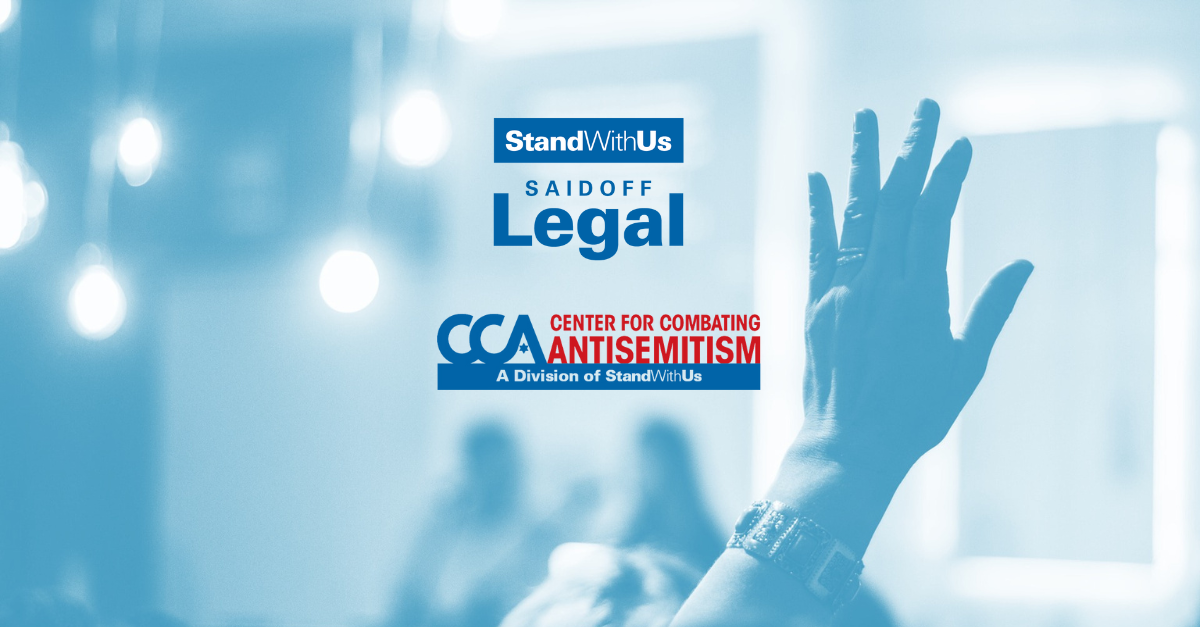
August 4, 2022
Dear University Administrators and Stakeholders,
We write on behalf of StandWithUs, an international non-profit organization with the dual mission of educating about Israel and fighting antisemitism. We wish to alert you to five issues relating to the Jewish community that are likely to arise on campuses throughout the country this academic year. Should they emerge, they will adversely impact the climate for Jewish students. We write to ensure you have notice of these issues and suggest solutions for addressing them. We also wish to provide you with resources to protect against the normalization or minimization of antisemitism at your school. Most importantly, please know we are here to help you navigate these matters. The five issues of concern are:
1) Faculty members hindering students’ educational opportunities because of antisemitic and/or anti-Israel bias.
In recent years, faculty members have attempted to stifle Jewish and Zionist students’ educational opportunities in line with the discriminatory Boycott, Divestment, Sanctions (BDS) campaign, which calls for an academic boycott of Israel. An academic boycott violates university academic guidelines and discrimination policies. Examples of a faculty member’s academic boycott may include refusing to help students apply for study abroad programs in Israel, refusing to review dissertations about Israel, or refusing to make recommendations on hiring, promotion, and grant-making decisions involving Jewish, Zionist, or Israeli students.
In short, there are numerous activities in which students regularly engage that could be stifled by biased faculty members who participate in BDS. We ask your administration to be on alert for student allegations of such discriminatory practice. If such incidents occur, we request that you take swift remedial action to protect students’ academic rights, hold faculty members accountable, and ensure an educational environment free from antisemitic discrimination. See this illustrative example from the University of Michigan .
2) Exploitation of the classroom to indoctrinate students with anti-Israel or antisemitic bias rather than teaching them critical thinking.
Classroom discussions that normalize or minimize antisemitism remain a primary way in which Jewish students feel marginalized on campus. Students increasingly report hiding the Zionist aspect* of their Jewish identity in the classroom for fear of retribution, intimidation, or ostracism by peers and/or grade retribution by professors. The American Association of University Professors’ (AAUP’s) Joint Statement on Rights and Freedoms of Students makes clear that “[t]he professor in the classroom and in conference should encourage free discussion, inquiry, and expression”; students “should be free to take reasoned exception to the data or views offered in any course of study and to reserve judgment about matters of opinion”; and they “should have protection through orderly procedures against prejudiced or capricious academic evaluation.”
We urge you to (1) explain this AAUP principle to all teaching faculty and staff; (2) ensure that there is an identifiable process for evaluating claims of antisemitic discrimination or bias in the classroom; and (3) educate students about their right to protection from biased instruction and how to avail themselves of a remedy should such bias occur. See this illustrative example from William Patterson University .
3) Biased curricula and materials that are not relevant to a course’s subject matter.
The AAUP report on Freedom and Responsibility states that, “it is improper for an instructor persistently to intrude material that has no relation to the subject, or fail to present the subject matter of the course as announced to the students and as approved by the faculty in their collective responsibility to the curriculum.” The AAUP Statement of Principles on Academic Freedom and Tenure similarly instructs that while “[t]eachers are entitled to freedom in the classroom in discussing their subject,…they should be careful not to introduce into their teaching controversial matter which has no relation to their subject.”
Faculty members who use classroom time to espouse biases against Israel and Jews often do so outside the scope of the subject matter at hand. This is in violation of professional standards and marginalizes Jewish students based on the Zionist component of their Jewish identity. Further, faculty who promote antisemitic conspiracy theories online, even on their personal accounts, marginalize Jewish students who fear retaliatory measures by virtue of their religious and ethnic identity. We urge you to ensure policies are in place to investigate and resolve such allegations of classroom misconduct. See this illustrative example from Rutgers University .
4) Misuse of official university social media accounts, listservs, and school logos or brand to promote one-sided political agendas and/or bigotry.
Academic departments and student government bodies should not champion and disseminate one-sided political viewpoints using their official capacity and access to official university assets, like listservs. When they do so, they likely act outside the scope of their departmental purview, professional standards of conduct, and the bounds of academic freedom. They fail to comply with the AAUP Report on Academic Freedom and Electronic Communications , which states that “faculty members ‘should make every effort to indicate that they are not speaking for the institution’ when in fact they are not doing so.”
When academic departments and student government bodies issue biased statements using official university channels, they misuse school resources for their own political agenda, violate professional standards, and silence members of the campus community with different perspectives. We encourage you to monitor misuse of your university’s communication channels and, if you believe there is a potential violation, issue immediate administrative guidance to correct misuse and reiterate the prevailing university policies and professional standards. See this illustrative example at Wayne State University .
5) Protection for Jewish students under Title VI of the Civil Rights Act.
Title VI of the Civil Rights Act of 1964 (Title VI) prohibits recipients of federal funding from engaging in discrimination (including harassment) on the basis of race, color, or national origin. Should such discrimination occur and create a pervasively hostile environment on a campus receiving federal funds, the administration is required to take action to remedy that hostile environment or risk losing its federal funding. See this illustrative example from New York University ; NYU ultimately settled a Title VI complaint after years of hostile and illegal campus activity towards Jewish students, often by Students for Justice in Palestine. (See Appendix below for background information.)
Additionally, the U.S. Department of Education’s Office for Civil Rights (OCR) has developed a digital binder addressing issues concerning Title VI, including guidance clarifying that “Title VI protects all students, including Jewish students, from discrimination based on race, color, and national origin.” OCR recognizes that unlawful discrimination against Jewish students under Title VI is sometimes based on the real or perceived ties of Jewish students to Israel.
In light of the growing problem of antisemitism on campuses, including antisemitic incidents related to anti-Israel bias and anti-Zionism, we hope that your administration—including your Diversity, Equity, and Inclusion (DEI) staff—will review OCR’s above-linked materials and utilize them. Specifically, we urge your DEI office to (1) include antisemitism in its bias trainings about anti-racism and fighting discrimination; (2) appoint a diversity officer specifically to handle cases of antisemitism; and (3) consider the International Holocaust Remembrance Alliance (IHRA) Working Definition of Antisemitism , as required by Executive Order 13899 , when addressing potential antisemitic incidents on campus.
Concluding Thoughts
Thank you for your prompt attention to these concerns. If your administration and DEI offices prioritize social justice issues, then combating antisemitism on campus should be a major focus. While Jews in the United States comprise only 2.4 percent of the population as of 2020, the Jewish community is the greatest target of religiously motivated hate crimes—a staggering 55 percent of all such hate crimes, according to the latest FBI data .
Antisemitism can be difficult to identify. We offer educational materials, recommendations, and trainings on how to identify antisemitic or anti-Israel conduct. We are also happy to work with your university on best practices and would welcome the opportunity to meet with your administration. In addition to the support we are offering, we highly encourage you to work in partnership with your local Jewish community—including professionals, faculty, and students—to collaborate on addressing these issues.
We look forward to receiving feedback from you regarding ways your university might implement policies for the ideas set forth in this letter. We can be reached at legal@standwithus.com .
Sincerely,
Roz Rothstein
CEO & Co Founder, StandWithUs
Yael Lerman
Director
StandWithUs Saidoff Legal Department
Carly Gammill
Director
Center For Combating Antisemitism
A PPENDIX:
BACKGROUND ON STUDENTS FOR JUSTICE IN PALESTINE
As referenced above in our discussion of Title VI, Students for Justice in Palestine (SJP) has a deeply disturbing record both on individual campuses and nationally. The group reportedly receives funding and other forms of support from non-governmental organizations that are tied to multiple designated terror organizations, including Hamas, Palestinian Islamic Jihad, and the Popular Front for the Liberation of Palestine (PFLP). National SJP conferences have featured lectures from terrorists like Khader Adnan, an Islamic Jihad leader who called for suicide bombings against Israeli civilians. SJP also spearheaded a campaign to glorify and raise money for Rasmea Odeh, a convicted terrorist and murderer who helped carry out a PFLP terrorist attack that killed two Israeli civilians. Various SJP chapters have welcomed terrorists like Marwan Barghouti and Leila Khaled to campus .
SJP frequently expresses support for an “ Intifada , ” a campaign calling for violence against Israelis. It has threatened and glorified violence against Jewish students and others who support Israel’s existence, including by harassing and threatening with violence campus leaders and guest speakers who oppose them.
SJP spreads hate against Jews, Israelis, and Zionists on campuses on a regular basis . Much of its rhetoric, understood in context of its stated organizational goals, meets the International Holocaust Remembrance Alliance ( IHRA ) definition and examples of antisemitism, which have been adopted and applied by more than 30 democratic nations across the world. In the United States, the IHRA definition of antisemitism has been recognized by both the Department of State and Department of Education.
For instance, SJP denies I srael’s right to exist, calls for the elimination of Israel, demonizes Israelis, and attacks Israel using classic antisemitic tropes. SJP’s troubles are no secret within the University of Illinois system. In fact, the University of Illinois Urbana-Champaign was the focus of a Department of Education investigation for failing to curb antisemitism on campus, caused in large part by the activities of SJP.
In spring 2021, University of Illinois at Chicago’s SJP posted an alarming, flagrantly antisemitic “Zionist Shaming” campaign on its official SJP student group Instagram account . We believe this created an indisputably hostile, intimidating, threatening, and harassing campus environment for Jewish, Zionist, and Israeli students. The origins of this post and a second hateful, harassing post appear to have come from a former UIC student who held both leadership positions within SJP as well as UIC employment and campus-wide leadership roles before her presumed graduation in 2021.
So divisive and hate-infused is SJP’s presence on campuses that administrators at multiple universities have denounced the group. Tufts University c ondemned SJP’s honoring with a “collaboration award,” saying of the oversight: “We strongly disapprove of this award in light of SJP’s concerning policy positions, including its association with the BDS movement, elements of which we view as anti-Semitic.” Fordham University refused to allow SJP to start a student club because of the group’s polarizing impact on the campus climate, and New York University reached a Title VI settlement because the administration refused to take concrete action against SJP when the group repeatedly violated campus policies and local and state laws .
*For most Jewish and Israeli students and faculty, Zionism—support for Israel’s existence and the right of Jews to self-determination in their ancestral home—is a core component of their Jewish ethno-ancestral and/or religious identity.





